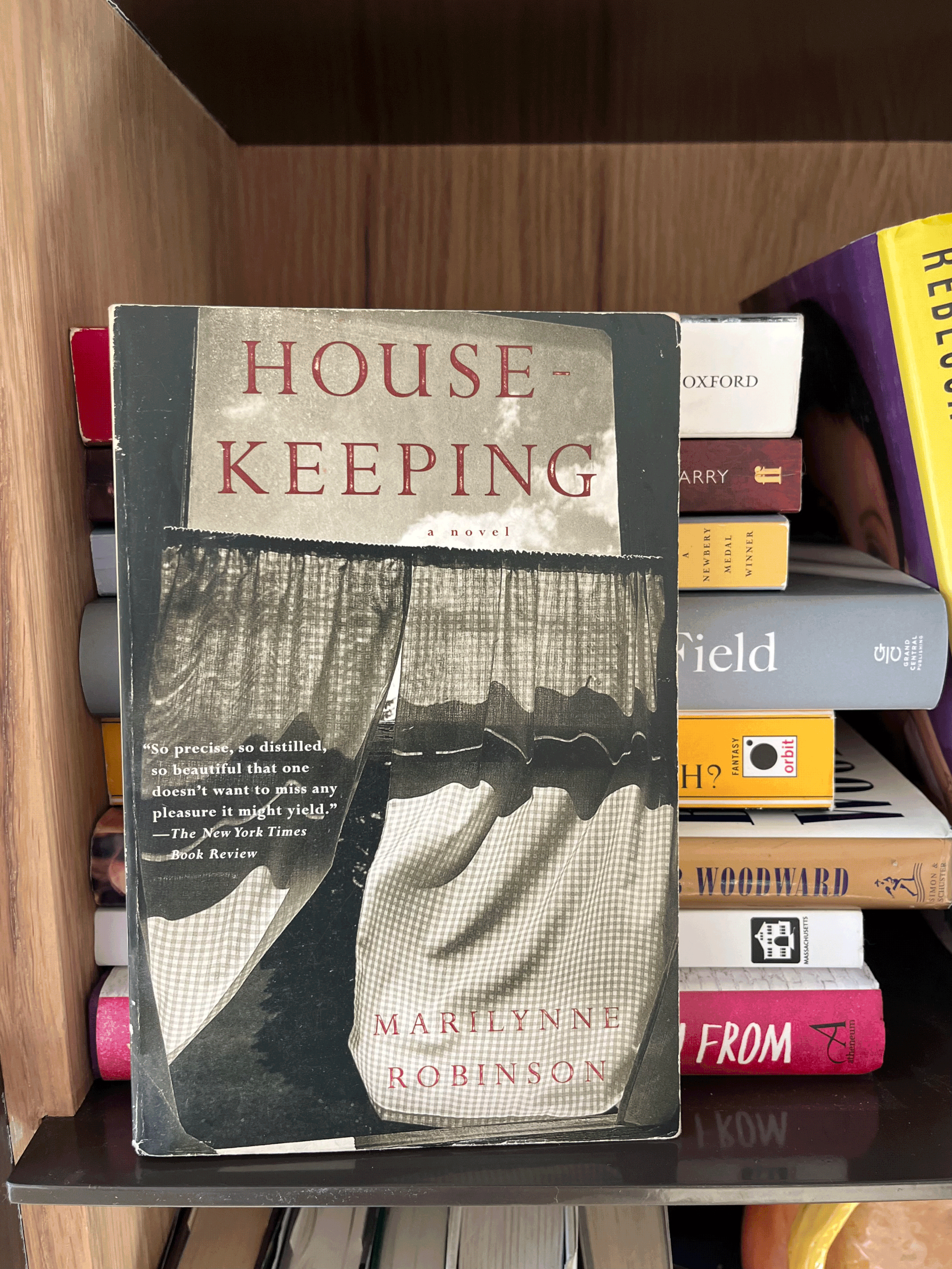
READ ALL ABOUT IT
Since 2012, I’ve been writing about books. And the act of reading. And the importance of story and narrative. But, mostly, the underlying theme of all I write is how taking a moment to stop and digest some longform text — instead of scrolling, instead of watching a video, instead of multitasking — can be one of the most grounding things we can do for ourselves. Here’s the one-stop online home for all this writing.
You can read more about me and my work by moseying over here. Want to peruse periodic “essay drops” — excerpts from my work-in-progress essay collection about Homesickness? Here ya go.

Birthday Book Recs 25/50 : Housekeeping by Marilynne Robinson
Birthday Book Recs: 25/50
Housekeeping by Marilynne Robinson

Dayswork
Some real literary figures feature in Dayswork, a novel by Chris Bachelder and Jennifer Habel (who are married to each other). Namely, Herman Melville, but also Nathaniel Hawthorne, Robert Lowell, literary critic Elizabeth Hardwick, and the still-living and Pulitzer-winning Melville biographer Hershel Parker (thinly veiled as “The Biographer”). They aren’t characters, exactly, as they play the historical figures that they actually are only through the lens of the protagonist’s internet deep dive as she becomes obsessed with Melville during the early days of the pandemic — that time when we were all sequestered inside with our computers as our only tethers to the outside world.

Let Us Descend
And this is why Oprah is the queen. I mean, Jesmyn Ward is the queen. But they’re both the queens for different, but linked, reasons.

My Name is Leon
Since college (or earlier?), I’ve pondered the theory that there are a finite number of story structures (ie “overcoming the monster,” “tragedy,” etc.)

Not Oprah. Not Reese. Just Me: A Lifely Read & My Top 10 Book Club Picks
Sometimes I think of this blog as my own personal book club. I pick a book, read it, and then discuss it with – myself. That’s the writing part. What happens next, though, is I’ll receive a text from a friend who’s read a post and continue the “conversation” or someone will comment online about some aspect of a post with an interesting thought. So perhaps this blog is, in fact, kind of a “real life book club.” Readers and I “meet” outside of a regular gathering, but the jumping off point for discussion is – hey ho – right here.

Resolute
A couple of months ago, I started using the Nike running app, and my least favorite part is picking which emoticon to select at the end of my run. I usually select the second- and third-highest “smiley” (just one shy of what is apparently “euphoria,” which is probably an indication that I should be pushing myself more), but I have never once referred back to these to analyze the different conditions that may inch me toward one or the other. It’s too simplistic of a method to chart progress, for although the app syncs with the local weather, it really has no clue how much the whipping wind from the Irish Sea affects my first mile or two. Similarly, although I may enter a relatively happy face because I feel physically good after the run, the little yellow face won’t account for the non-physical issues I’ve been tossing and turning in my mind on a particular day. Mostly, though, I can’t accurately compare my run – the same distance, the same route – to another. This 5-mile route is my only benchmark, and until I stretch out that length or at least huff and puff a little more, I won’t know what any of those frown-y faces on the right of my phone’s screen really mean. Nor will I appreciate the nice and easy little workout I’ve created for myself. (Note to self: It’s never too late to take up New Years resolutions.)

The Better Way
As soon as we have our first experiences with the stage—waiting to go on for a piano recital or a nerve-wracking regional spelling bee—we learn the backstage rule of thumb that teachers and other official adults-in-charge have screeched for years: If you can see people in the audience, they can see you too. With little children, however, keeping away from the glow of those footlights is a tricky proposition; they all want to see, and although they may not be aware of it, their main goal is often to be seen themselves. As for the adults in the audience? Although they may be glad that their children are obeying, it is that lone excited child waving frantically to Mom and Dad whom they’ll all remember. And for those children too meek or too compliant to make their faces known? Well, the audience won’t see what they’re doing until they come on at the appointed time, in the appointed fashion.

